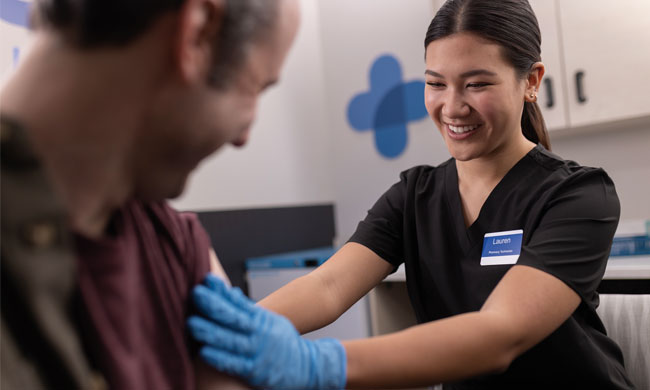Taking steps to protect your family from infectious diseases is of paramount importance. The Centers for Disease Control and Prevention (CDC) affirms that vaccines play a crucial role in generating protective antibodies that combat infections. Routine vaccinations, such as MMR (measles, mumps, and rubella) and Tdap (tetanus, diphtheria, and pertussis), prevent approximately 4 million deaths annually. Astonishingly, only 1 in 5 adults are up to date with their vaccines.
Several factors, including convenience, accessibility, and trust, contribute to the low vaccination rates among specific demographic groups and geographical regions. Community pharmacies and clinics, like the Kroger Family of Companies’ Pharmacies and The Little Clinic, have emerged as accessible and convenient healthcare options beyond traditional settings. These establishments offer a spectrum of top-quality services, including medication guidance, health screenings, and immunizations.
Routine preventive care, encompassing vaccinations, can be administered at various intervals throughout the year. Certain populations, like individuals aged 60 and above, those with chronic conditions, and specific minority groups, face a higher risk of contracting certain infections. Therefore, they are encouraged to maintain updated vaccinations and boosters throughout the year. (For children below 5 years, consult local pharmacists or clinicians for vaccination guidelines.)
The CDC recommends that everyone aged 6 months and older receive an annual flu vaccine. Influenza, commonly known as the flu, is a contagious respiratory virus that affects the nose, throat, and lungs, potentially leading to severe illness, hospitalization, or even death. As dominant flu strains constantly shift, protection from a single flu vaccine diminishes over time.
Retail pharmacies and clinics play an integral role in their local communities and are committed to vaccine education and outreach. Beyond guarding against diseases like influenza, vaccines offer protection against hepatitis A, hepatitis B, varicella (chickenpox), measles, RSV, pertussis (whooping cough), COVID-19, and more. By disseminating accurate information, retail pharmacies and clinics empower individuals to make informed health decisions for themselves and their loved ones.
Research highlights that schools and colleges can be breeding grounds for disease transmission that affects all age groups. Immunizing students against vaccine-preventable diseases results in fewer absences due to illness.
Ensuring children are current on their vaccinations also provides an opportunity for parents and caregivers to assess their preventive health statuses. The National Institutes of Health reveal that vaccine-preventable diseases cost the nation approximately $27 billion annually in lost wages and increased healthcare expenses.
Unlike certain traditional healthcare settings, retail pharmacies and clinics are easily accessible, often nestled within local communities and boasting extended hours to accommodate busy schedules. This facilitates flexibility for families seeking vaccinations. Retail pharmacies like the Kroger Family of Companies’ Pharmacies and other similar establishments offer dedicated vaccine clinics within their premises, seamlessly integrating vaccinations into the healthcare experience.
Annual Gallup Polls consistently affirm that pharmacists and nurse practitioners rank among the most trusted figures in the medical field. Healthcare professionals at retail pharmacies and clinics undergo rigorous training, possessing comprehensive knowledge about vaccines, proper storage, handling, and administration techniques.
By prioritizing proactive vaccinations, retail pharmacies foster an environment that nurtures the well-being of students, educators, staff, and families, thereby promoting healthier lives within communities.
To learn more, visit kroger.com/vaccinations or visit a local pharmacy or clinic.



